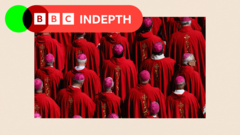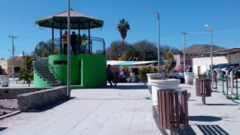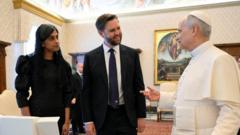Ahead of the conclave to elect a new Pope, the internal dynamics within the Vatican reveal a significant split among cardinals regarding the Church's direction and legacy of Pope Francis. From May 7, the Santa Marta guesthouse will house 133 cardinals, who face a monumental task: to choose a successor for the late Pope Francis, who profoundly influenced the Church's trajectory during his 12-year tenure. The guesthouse's atmosphere is heavy with expectation, and one room remains sealed in memory of Francis, awaiting the new Pope's arrival.
The Vatican's Divisions and Aspirations as Cardinals Prepare for New Papacy

The Vatican's Divisions and Aspirations as Cardinals Prepare for New Papacy
As the conclave looms, cardinals grapple with the legacy of Pope Francis and the Church's future direction.
The influence of Francis is undeniably substantial, as he appointed about 80% of the cardinals who will vote. His tenure was marked by a notable shift towards prioritizing the voices of the faithful around the world, particularly the poor and marginalized. During pre-conclave meetings, cardinals grappled with the various needs of the global Church—reflecting its diversity. For the first time, representatives from countries including South Sudan, Papua New Guinea, and Rwanda will join the conclave, highlighting the Church's growing international dimension.
The discussions also reflect contrasting priorities: European cardinals may emphasize revitalizing dwindling congregations, while their counterparts in Africa and Asia focus on social justice and poverty concerns. The new Pope will need to strike a balance between these disparate realities to lead effectively. As the smallest sovereign state in the Vatican City, the Pope also holds significant global influence, with Francis amplifying his role as an advocate for the marginalized and seeking peace in conflict zones.
Despite broad recognition of Francis's work, uncertainty lingers among cardinals. Critical voices question the feasibility of his initiatives, particularly regarding sexual abuse scandals and financial reforms within the Church. The need for clarity in implementing these reforms post-Francis is paramount, as many supporters yearn for continuity and cohesion without alienating traditionalists.
In the wake of Francis's death, an underlying theme emerged: the necessity of uniting the diverse opinions within the Church, as exemplified by Cardinal Nichols' assertion that the new leader should carry forward the moral compass that has become vital for many. Ultimately, cardinals will enter the Sistine Chapel not just as individual voters, but as a collective seeking divine guidance to shape the Catholic Church's future amid ongoing debates about its direction and relevance in an evolving world.
The discussions also reflect contrasting priorities: European cardinals may emphasize revitalizing dwindling congregations, while their counterparts in Africa and Asia focus on social justice and poverty concerns. The new Pope will need to strike a balance between these disparate realities to lead effectively. As the smallest sovereign state in the Vatican City, the Pope also holds significant global influence, with Francis amplifying his role as an advocate for the marginalized and seeking peace in conflict zones.
Despite broad recognition of Francis's work, uncertainty lingers among cardinals. Critical voices question the feasibility of his initiatives, particularly regarding sexual abuse scandals and financial reforms within the Church. The need for clarity in implementing these reforms post-Francis is paramount, as many supporters yearn for continuity and cohesion without alienating traditionalists.
In the wake of Francis's death, an underlying theme emerged: the necessity of uniting the diverse opinions within the Church, as exemplified by Cardinal Nichols' assertion that the new leader should carry forward the moral compass that has become vital for many. Ultimately, cardinals will enter the Sistine Chapel not just as individual voters, but as a collective seeking divine guidance to shape the Catholic Church's future amid ongoing debates about its direction and relevance in an evolving world.





















